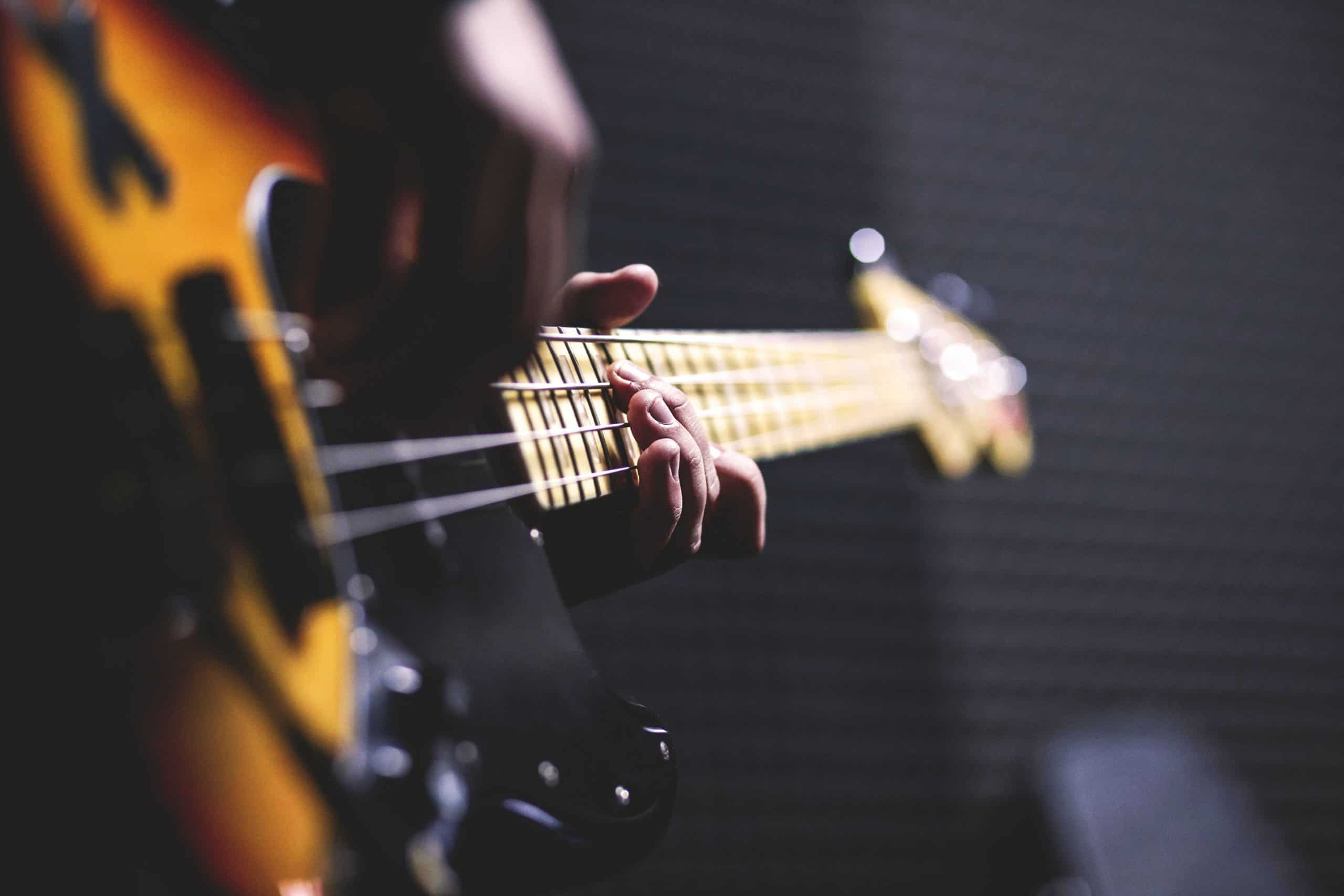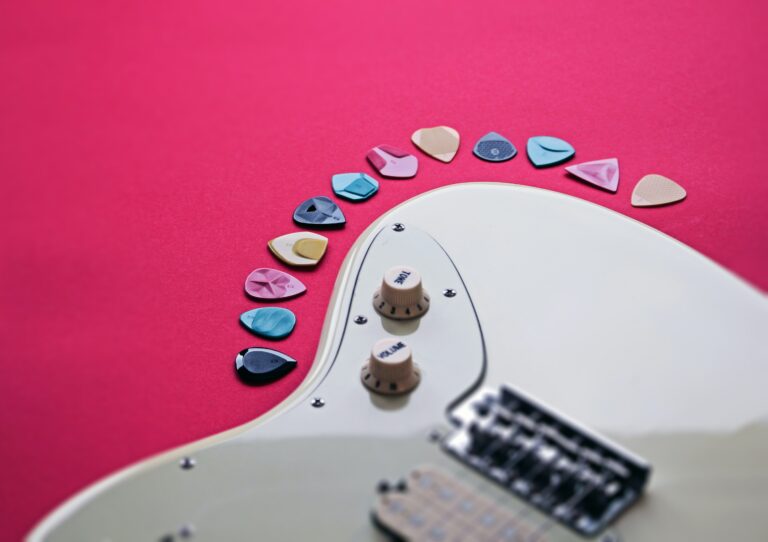Why is Bass Guitar Hard to Hear?
Beneath the soaring melodies of vocals, drums, guitars, and MIDI tracks, the bass guitar thumps away its rhythm inaudible to all but the most discerning listeners. If you listen to music frequently (as we imagine you do), then you might start to wonder what purpose the bass guitar serves when it ceases to be heard once more forthcoming instruments step in. So, why is bass guitar hard to hear?
It’s not. A bass guitar is easy to hear but hard to perceive because you hear the bass alongside other instruments when you listen to a song. The difficulty lies in honing your ear to the bass guitar alone.
Below, we will explore some of the science behind what makes bass fall under this assumption.
You Aren’t Listening to Bass With Proper Equipment
There’s a reason that good bass comes at a high price. Folks likely wouldn’t spend hundreds to thousands of dollars on subwoofers if there were nothing extra to get out of listening to music through bass. The sensation of being moved by sound through the vibrating resonance of a bass guitar is a significant driver of this demand.
Unfortunately, most headphones and car speakers don’t have the power capabilities to produce distinctive bass tones. This lack of power doesn’t mean you can’t hear it, but you’ll undoubtedly have trouble feeling it.

Humans Ears are Better at Hearing Medium Frequencies Over Bass
The further you move from the sweet spot of human hearing, the harder it becomes to hear. While the notes of a bass guitar fall within the “medium frequency” of all existing sounds, they sit lower on the auditory field than the overlapping frequencies of overtone-dominant instruments like piano and guitar.
The average person can hear between 20 and 20,000 hertz. A bass guitar with standard EADG tuning has a range between 41 and 196 hertz. So, while the bass guitar notes fall within this range, they fall to the left of that “sweet spot” of human hearing. Therefore, musicians must play notes louder to hit the right auditory field.
Bass is Hard to Hear Because of Timbre
Timbre, commonly called “tone,” refers to the difference in sound achievable with the same note. This is why a C on the bass guitar sounds different from a low C on the piano. It is similar to why a flute sounds like a banjo when using the same scale.
Consequently, the way an instrument sounds has a substantial effect on how well you hear it. Sharper, brighter, and harsher sounding instruments like trumpets and overdriven electric guitars are more noticeable than most bass guitars’ soft, deep sounds.
You Don’t Know How To Hear The Bass Guitar
Before you feel that your credibility as an informed music listener is under attack, know that the nature of modern music is mostly to blame for the downfall of active listening.
Technology makes listening to copious amounts of music effortless (a great thing). Meanwhile, the technical components and intricacies of songs are less relevant (a not-so-great thing). This situation is because more songs mean less effort to expend in listening to each one.
Musicians tend to be better at picking apart songs and separating their components like bass, vocals, percussion, and treble. However, even musicians aren’t perfect. Bass guitar especially becomes so intertwined with the rest of the song that picking it out is like trying to remove gum stuck in hair, and some are better at that than others.
How To Hear The Bass In A Song
This goal is great for anyone who listens to music ever. Fortunately, you can do plenty of things to hone your ear so you can better appreciate this incredible instrument.
Listen To Bass Backing Tracks
If you feel like you can’t find the bass guitar in songs when it is there, you will notice when it isn’t there. There is a variety of content on YouTube for every instrumentalist. There are also other websites for practicing alongside pre-recorded audio.
Bass guitars are not an exception to this rule. You’ll notice that music without bass sounds a little bit emptier, and that can certainly help you catch the “fullness” in songs as the bass.
Experiment With Sound Equalizers
Often the bass can be quickly brought out by simply moving a slider. You can play around with the equalizer built into your audio device or load an audio file of a song into free software like Audacity.
Move the bass slider up and down to observe the effects of those modifications and note how easily you can hear the bass after boosting it and reducing it back to normal. Afterward, you should be able to identify the bass conclusively.
Good news — once your ear can pick out the bass guitar, it’s hard to neglect to notice it when you listen to music in the future.

Invest In Decent Speakers or Headphones
Bass is a very technically demanding component of sound fidelity. When manufacturers produce cheap headphones and speakers, it becomes a necessary sacrifice.
A common complaint with budget audio is that whatever bass can sounds “muddy,” which does not help an enjoyable listening experience. Besides, you don’t want to defile the bass player’s talent by depicting their work.
Fortunately, decent doesn’t have to mean expensive. While headphones and speakers costing hundreds are under far more pressure to deliver excellent audio, there are still plenty of options costing less that will give you a deep and immersive bass experience. Plenty of reviews out there to let you know if you’re getting your money’s worth.
Become A Bass Player
There are many benefits to reap from learning to play bass. However, hearing and better appreciate that part of music brings you closer to virtually any genre of music.
When you play bass guitar, you hear the sounds and feel the resonance coming from the instrument into your body as you play. You’ll come to understand exactly what people mean when they say “bass is felt” and likely become one of those people yourself.
Bass Guitar FAQs
Why are Bass Guitars So Big?
If you’ve ever seen a bass guitar next to a standard electric guitar, you’d have noticed three things: the traditional guitar has two additional strings, the bass’s strings are thicker, and the neck/fretboard is bigger.
The invention of electronic pickups has allowed a tremendous size reduction from the acoustic behemoths of jazz bands in the 1920s and 1930s. Still, the fundamentals of sound keep bass instruments considerably larger than their higher-pitched accompaniments because of two factors: radius and vibration length.
When these go up, the pitch goes down. The result? Basses have longer necks and thicker strings.
Why Is A Bass Guitar Important In A Band?
“Base” and “bass” are homophones for a good reason (intentional or coincidental) because they are conceptually the same. The word “base” generally refers to either the literal bottom or fundamental part of something. Without bases, lamps would not be able to stand upright, and mountains would crumble.
On a similar note, the musicians in a band wouldn’t have a harmonic or rhythmic foundation to base (see?) the rest of the song without bass guitar. Even with steady drumbeats, there would still be an unbridged emptiness causing distance between each instrument. A bass guitar removes that hollowness.
Do You Need A Bass Guitar To Make Good Music?
No, bass can come in many forms. Do you need bass to make good music? Put it this way: bass never hurts anything and always has something to add.
Bass adds fullness and depth to music which is rarely not welcomed. However, selectively refraining from using bass in certain parts of a song is often an innovative and practical choice.
Intros commonly avoid using the bass to establish mood and tempo. So, when the bass does drop, it sounds even more impressive. So you don’t need bass, but you don’t need floors in your home in the same way.
Conclusion
Bass guitar is not hard to hear, but it can be hard to perceive. When accompanied by several instruments with higher frequencies, sharper timbre, and more dominant sounds, bass guitar tends to fade into the background.
It works in much the same way as an air conditioner that you tune out as it hums but immediately notice once it cuts off. The bass guitar is there, and you hear it whether you recognize it or not.
Ultimately, none of this has to be. With practice, you can hear the bass guitar just as clearly as every other instrument. Bass guitar establishes harmony, rhythm, and gives any song an added level of depth. After all, the bass is the low-pitched fabric that ultimately weaves music together and transforms an amalgam of instruments into a compelling song.








